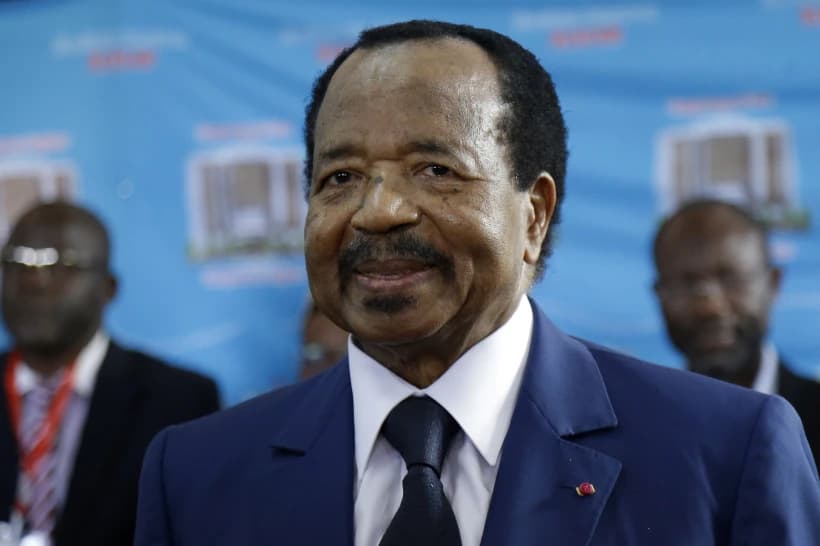YAOUNDÉ, Cameroon – Catholic bishops in Cameroon are increasingly urging President Paul Biya not to seek another term of office as the nation gears up for a presidential election in October.
In separate statements, the bishops have cited the President’s failing health and advanced age, together with years of un-kept promises as reasons Biya should step aside.
Biya, 91, is the world’s oldest leader. He has spent 42 of those years as president. He has not formally declared his candidacy, but in his New Year address to the nation, the president hinted he still intends to stay in power.
“Why do we always expect the head of state to be a candidate?” Bishop Barthélemy Yaouda Hourgo of Yagoua in the country’s Far North region said.
“Enough is enough,” he continued, and explaining Biya is already too old to continue running the affairs of the nation.
Archbishop Samuel Kleda of Douala noted that asking Biya to seek re-election was “unrealistic.”
“What I want for my country is a peaceful transition. This means that we must organize elections in accordance with the norms, elections where everyone accepts the democratic game… We are human beings; at some point we will leave this world. We cannot work miracles. Those who are calling on Biya to stand again are not at all realistic,” Kleda said in an interview on RFI.
Biya’s supporters have been urging the president to seek an 8th term of office.
“I can assure you that my resolve to serve you remains steadfast and grows stronger by the day as we address the immense challenges facing us,” the president said in his New Year speech.
“I have heard your calls and encouragements, and I remain dedicated to serving our beloved nation,” he added.
The bishops aren’t going along with this.
Bishop Emmanuel Abbo of Ngaoundere noted that Cameroonians have suffered so much that even the devil “can’t inflict greater pain on the people of this country.”
“What have Cameroonians not suffered?” the bishop asked. He spoke about the saddening reality of young people who go to school without hope of ever getting a job, and the attendant consequence of young people resorting to drug abuse. He decried the deepening poverty in the country, and the widening gap between the rich and the poor and condemned the political class for stashing money in their homes while ordinary Cameroonians can’t provide for their basic needs.
According to the Food and Agriculture Organization (FAO), over 23 percent of Cameroonians live below the international poverty line, which is $2.15 per person per day. Extreme poverty could reach 25 percent by 2026 – affecting 8 million people.
“It would even be better if the devil took over the management of affairs in Cameroon,” Abbo said.
The bishop said that Cameroon’s hard-earned freedoms have been eroded, with dissent no longer tolerated.
“The most terrible suffering is that Cameroonians are forbidden to express their suffering,” he said, referring to threats by the Cameroon Minister of Territorial Administration, Paul Atanga Nji who describes the state as “a blender” that will crush anyone voicing contrary opinions to that of the government.
“How can we promise death to those who only ask for a minimum to survive?” the bishop asked.
The president’s supporters have pushed back, blasting the bishops for taking up “clearly partisan positions” with utter disregard for their clerical calling.
Gregoire Owona, Minister of Labour and Social Security in Biya’s Cabinet accused the bishops of taking “political positions, without analyzing all the consequences.”
Prof. Jacques Fame Ndongo, Secretary for Communication for the ruling party has also come up with arguments to justify why the bishops are wrong in calling on the president to simply step aside. He said the Constitution of Cameroon as well as the party’s statutes; together with base supporters all allows Biya the right to seek re-election.
“To say that Mr. Paul Biya should not seek another term in office is a matter of opinion,” Fame Ndongo said.
“What are the objective arguments (legal and political) put forward by those calling on President Paul Biya to take a well-deserved rest?” he asked.
He called on all political actors in the country to disregard the bishops’ “partisan” outburst, and instead prepare for competitive election in November.
There are however rising concerns that the election might not be free and fair, given Cameroon’s history of disputed results.
Biya assumed office in 1982 after the resignation of Cameroon’s first president, Ahmadou Ahidjo, who had led the country since its independence in 1960. As a young president, Biya promised democratic reforms. In 1992, Cameroon held its first multi-party presidential elections.
Opposition leader John Fru Ndi claimed victory, supported by national and international observers, but the Supreme Court declared Biya the winner. Since then, every Cameroonian election has faced challenges and allegations of irregularities.
Archbishop Kleda has said that “democracy doesn’t exist in Cameroon.”















